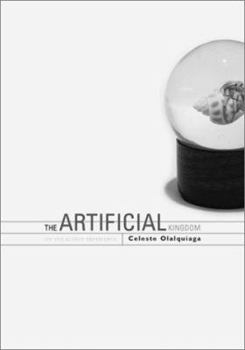Artificial Kingdom: On the Kitsch Experience
Select Format
Select Condition 
Book Overview
The Artificial Kingdom is the first book to provide a cultural history of kitsch, an immensely popular aesthetic phenomenon that has always been disdained as "bad taste," or a cheap imitation of art.... This description may be from another edition of this product.
Format:Paperback
Language:English
ISBN:081664117X
ISBN13:9780816641178
Release Date:December 2002
Publisher:University of Minnesota Press
Length:336 Pages
Weight:0.78 lbs.
Dimensions:0.7" x 5.3" x 7.5"
Customer Reviews
3 ratings
Mesmerizing
Published by Thriftbooks.com User , 21 years ago
I don't find this book derivative of Benjamin so much as openly drawing on him. Olalquiaga doesn't ape his work on kitsch - she applies it intelligently to her own research. Artificial Kingdom struck a deep chord with me. I concede that it is not the most rigorous examination of the kitsch experience possible, and some chapters are separated by intermissions of glazed ruminations that haunt the analysis and reverberate beneath it with personal conviction. But this is what I appreciate most about the book. You could do worse than recall in your reader Bachelard's reveries on the poetics of space. Olalquiaga's passage describing Rodney's marine home crystallizing around him into a glassy temporal suspension is as beautiful as anything by the sources from which she appears to draw her models.
The Artificial Kingdom: A Treasury of the Kitsch Experience
Published by Thriftbooks.com User , 24 years ago
This is the most original work of non-fiction I have ever read. The author is able to write at great length about very unpromising subjects--such as snow-globes or the emotional significance of dust--with a sort of piercing intelligence that allows her to uncover beauty and meaning where others might see only bad art. Although frequently humorous, the book never ridicules kitsch; rather it discusses deep-seated human needs, and then shows how kitsch is an attempt to satisfy them. I read this book over a year ago, and I still find it to be a source of inspiration.
cultural history and philosophy collide
Published by Thriftbooks.com User , 25 years ago
This brief, souvenir-inspired history of kitsch is also an ornate, brooding meditation on memory. In "trading the life of the memory for its cultural fossil," Olalquiaga reveals the origins of Atlantis in popular culture, of snow globes (the earliest said to feature Marie Antoinette with parasol), of aquaria and their folly-like porcelain castles, and notes that both Colette and Eva Peron amassed large collections of glass paperweights. Relating her feelings about a failed love affair and the redemptive qualities of Rodney, a hermit crab trapped inside her favorite paperweight, the writer transcends her anonymous epigram, "Styles die, only kitsch survives."






